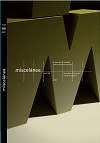Tourism and Identitary Conflicts in Monica Ali's Alentejo Blue
DOI:
https://doi.org/10.26754/ojs_misc/mj.20176788Keywords:
Monica Ali, Alentejo Blue, short story cycle, tourism, writing practiceAbstract
This paper explores the problematic cross-cultural encounters in Monica Ali’s work Alentejo Blue (2006) set in Mamarrosa, a fictional place in the Portuguese region of the Alentejo. This collection is a composite of nine stories alternately focalised by different characters, posed in an interstitial position between the polyphonic novel and short story cycle. The narrative’s reluctance to fit in genre taxonomies mirrors the heterogeneous nature of the characters’ perspectives, ranging from British expatriates and tourists in Portugal to the locals’ views of these visitors. Such a conflation at a complex cultural crossroads favours no inspiring encounters, but rather fuels feelings of frustration, a profound sense of displacement and a tantalising incapability of solving conflicts. The paper also examines the second story in the collection, which entails the experience of British writer Harry Stanton in the Alentejo as paradigmatic of a subjective projection of the preconceptions and prejudices which most often intervene in a tourist’s construction of place, and which eventually pertain to culturally erected barriers between the self and the Other.
Downloads
References
Ali, Monica. 2003. “Where I’m Coming From”. The Guardian (June 17). <http://www.theguardian.com/books/20 03/jun/17/artsfeatures.fiction>. Accessed October 7, 2016.
Ali, Monica. 2006. Alentejo Blue. London: Doubleday.
Bauman, Zygmunt. 1994. “From Pilgrim to Tourist”. Moderna Tider (September): 18-36.
Bauman, Zygmunt. 2001. “Ambivalence and Order”. In Beilharz, Peter (ed.) The Bauman Reader. Oxford: Blackwells: 288-297.
Berger, John. 1972. Ways of Seeing. Harmondsworth: Penguin.
Boehmer, Elleke. 2005. Stories of Women: Gender and Narrative in the Postcolonial Nation. Manchester: Manchester U.P.
Craik, Jennifer. 2005. “The Culture of Tourism”. In Rojek, Chris and John Urry (eds.) Touring Cultures: Transformations of Travel and Theory. London: Routledge: 113-136.
Dunn, Maggie and Ann Morris. 1995. The Composite Novel: The Short Story Cycle in Transition. New York: Twayne.
Ferguson, Susan. 2003. “Sequences, Anti-Sequences, Cycles, and Composite Novels: The Short Story in Genre Criticism”. Journal of the Short Story in English (41): 103–117.
Garland Mann, Susan. 1988. The Short Story Cycle: A Genre Companion and Reference Guide. Westport: Greenwood Press.
Germanà, Monica. 2011. “From Hijab to Sweatshops: Segregated Bodies and Contested Space in Monica Ali’s Brick Lane”. In Teverson, Andrew, Sara Upstone and Edward Soja (eds.) Postcolonial Spaces: The Politics of Place in Contemporary Culture. Basingstoke: Macmillan: 67-82.
Gregg, Allan. 2011. “Monica Ali on Brick Lane and Alentejo Blue”. <https://www.youtube.com/watch?v=eXotqauHbC8>. Accessed October 7, 2016.
Ingram, Forrest. 1971. Representative Short Story Cycles of the Twentieth Century. Studies in a Literary Genre. The Hague: Mouton.
Kennedy, Gerald (ed.) 1995. Modern American Short Story Sequences: Composite Fictions and Fictive Communities. Cambridge & New York: Cambridge U.P.
Kral, Francoise. 2005. “Fictional Contexts, Actual Contexts, and Virtual Contexts in Brick Lane by Monica Ali”. Commonwealth Essays and Studies 28 (1): 109-118.
Luscher, Robert. 1989. “The Short Story Sequence: An Open Book”. In Lohafer, Susan and Jo Ellyn Clarey (eds.) Short Story Theory at a Crossroads. Baton Rouge: LSUP: 148-167.
March-Russell, Paul. 2009. The Short Story An Introduction. Edinburgh: Edinburgh U.P.
Marino, Elisabetta. 2008. “From Brick Lane to Alentejo Blue: Cross-cultural Encounters in Monica Ali’s Writing”. British and American
Studies (14): 51-58.
Mudge, Alden. 2006. “Monica Ali: Second Act”. BookPage (July). <http://bookpage.com/interviews/8360-monica-ali#.VgkeDMvtlBc>. Accessed 7 October, 2016.
Pérez Fernández, Irene. 2009. “Representing Third Spaces, Fluid Identities and Contested Spaces in Contemporary British Literature”. Atlantis: Journal of the Spanish Association of Anglo-American Studies 31 (2): 143-160.
Rojek, Chis. 2005. “Indexing, Dragging and the Social Construction of Tourist Sights”. In Rojek, Chris and John Urry (eds.) Touring Cultures: Transformations of Travel and Theory. London: Routledge: 52-74.
Shriver, Lionel. 2006. “On the Way to Nowhere”. The Daily Telegraph (June 11). <http://www.telegraph.co.uk/culture/books/3652842/On-the-way-to-nowhere.html>. Accessed 7 October, 2016.
Suárez Lafuente, Socorro. 2007. “La historia especial de la novela inglesa contemporánea: De Pilgrims a Nómades”. Odisea (8): 187-197.
Taylor, Catherine 2006. “Alentejo Blue by Monica Ali”. Independent (June 3). <http://www.independent.co.uk/arts-entertainment/books/reviews/alentejo-blue-by-monicaali-8596048.html>. Accessed 7 October, 2016.
Urry, John. 2002. The Tourist Gaze. London: Sage.
Urry, John and Chris Rojek (eds.) 2005. Touring Cultures: Transformations of Travel and Theory. London: Routledge.
Walter, Nathasha 2006. “Alentejo Blue by Monica Ali”. The Guardian (May 20). <https://www.theguardian.com/books/2006/may/20/featuresreviews.guardianreview14>. Accessed 7 October, 2016.
Weiss, Allan. 2009. “Between Collection and Cycle: The Mini-Cycle”. Short Story 17 (2): 78-90.
Zavala, Lauro. 2012. “The Boundaries of Serial Narrative”. In Patea, Viorica (ed.) Short Story Theories: A Twenty-first Century Perspective. Amsterdam: Rodopi: 281-297.
Downloads
Published
How to Cite
Issue
Section
License

This work is licensed under a Creative Commons Attribution-NonCommercial 4.0 International License.


